Contractor Comment: Big yields follow great start to harvest
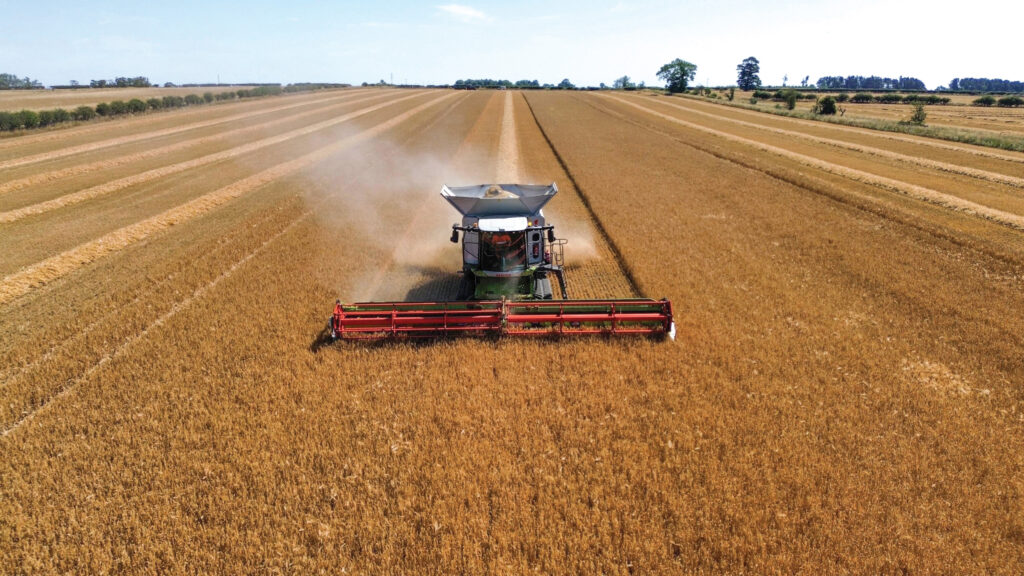 © JO Straughan
© JO Straughan Good weather has been the perfect present for JO Straughan’s 70th anniversary year, with well-timed rain and plenty of sunshine contributing to some stellar winter cereal yields in Northumberland.
Records to tumble thus far include the earliest start – 11 July, bettering the previous best in 1976 by six days – and the driest crop.
Some of the winter barley came in at 13.1% and, better still, hit just shy of 10t/ha.
See also: Contractor Comment: Foraging work ditched for an easier life
“The weather has been ideal: barley loves sunshine and the heavier ground up here wants a dry summer to yield well, but we also had a useful 23mm of rain in May and 27mm in June,” says JO Straughan’s governor, Roger Dickinson.
Business facts
JO Straughan & Co, Netherton Park Steads, Stannington, Morpeth, Northumberland
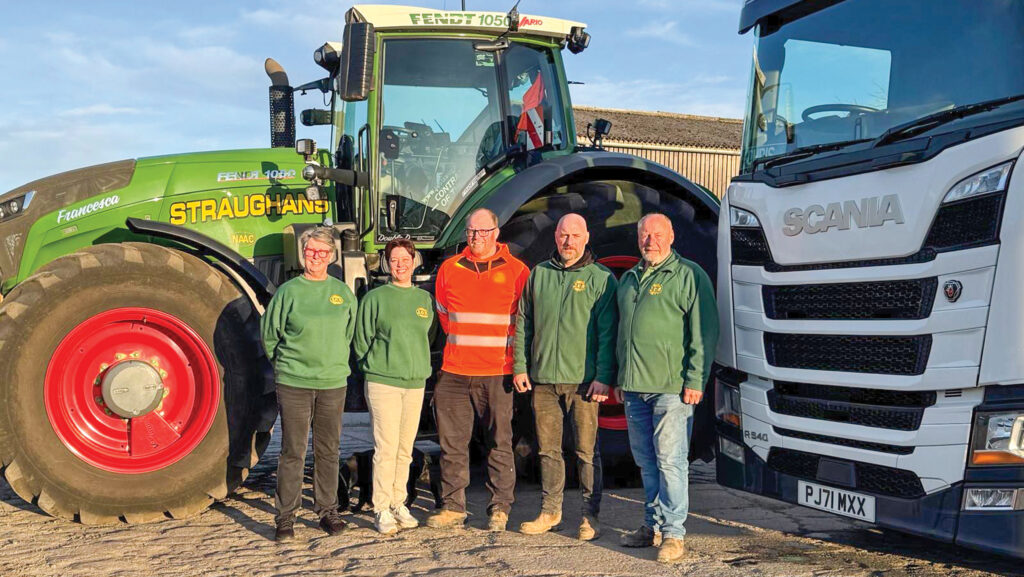
The JO Straughan team © JO Straughan
JO Straughan & Co has been offering a comprehensive range of agricultural, plant hire and haulage services to customers in Northumberland and the Scottish Borders since 1955.
Owner Roger Dickinson runs the business alongside his wife Sandra, sons David and Stuart, and daughter-in-law, Debbie.
- Main services: Grass silage (2,500ha), combining (1,400ha), cultivating and drilling (3,400ha), square baling (45,000 bales)
- Other: 400ha contract farming (stubble-to-stubble arable contracts), treated biosolids spreading (55,000t), bulk haulage of straw (2,500t), grain (16,000t) and biomass wood pellets (10,000t), plant hire and machinery transport
- Staff: 11 full-time plus up to another three during the busy season
Wheat crops are looking well too, spring barley less so. Though sown in good conditions, it has run out of steam and patchy variations in ripening are expected.
“We’ll have to be patient and ready with the Roundup. It’s all part of the fun – there are never two years alike,” he adds.
Grass goes smoothly
The silage campaign also kicked off earlier than usual, with first-cut grass crops delivering on quality and, to a degree, quantity.
It proceeded without hiccups until the last weekend of second cut, when one of the two Krone 1290 HDP big square balers – a four-year-old model and the firm’s sole XC chopping version – came a cropper.
And the prognosis was serious: a lay-up of at least a week due to a major split in the main frame.
Much to the Dickinsons’ frustration, this was a known issue – evidenced by the fact that Krone produces a specific “repair kit” for the ailment, complete with a fitting jig.
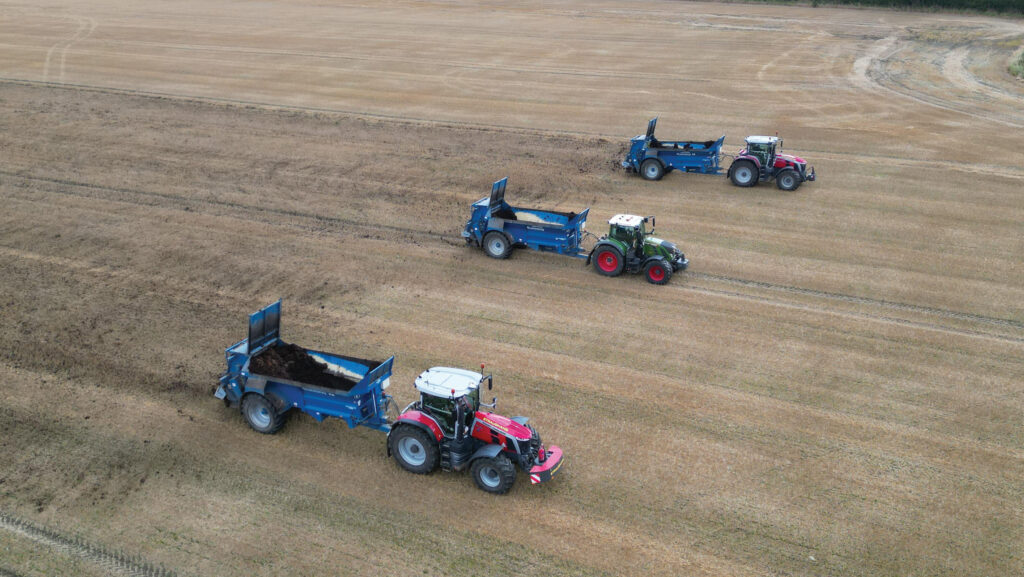
Massey Ferguson 8S tractors are hired in for biosolids duties © JO Straughan
“If that’s the case then they should have sent a note to dealers and owners, and it could have been addressed over the winter.”
As it is, the repair, which involves hoicking out 3t worth of flywheel and gearbox, will be a 15-hour job by Krone’s reckoning; dealer Carrs Billington puts it at nearer 40 hours.
As for the cost? “We’ve come to an arrangement via a very diplomatic telephone call,” says Roger tactfully.
The downtime is particularly galling given Straughan recently trimmed its 1290 fleet from three to two, putting added pressure on the pair and leaving no room for hold-ups.
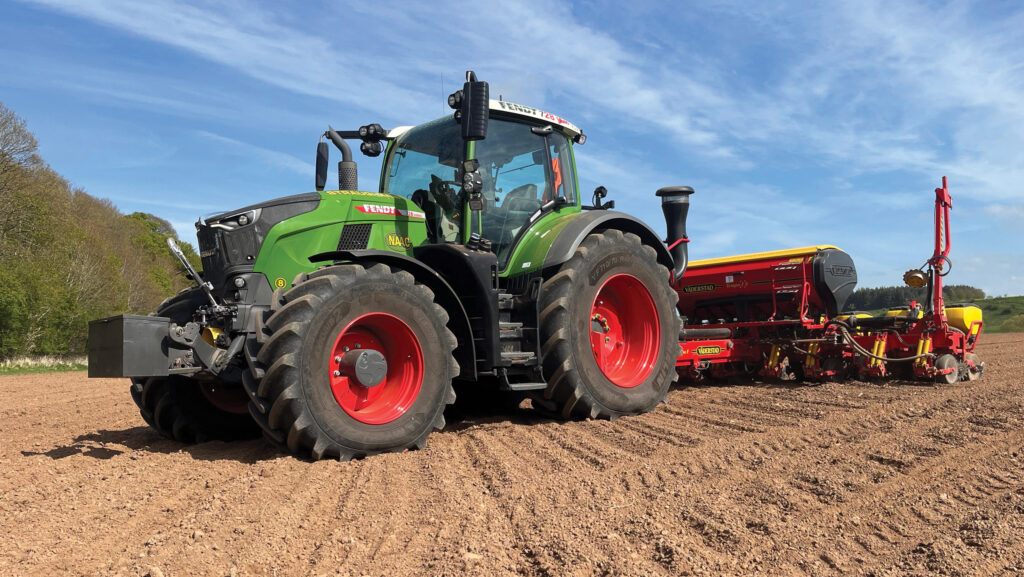
Fendt 728 has proved perfect for drilling and baling © JO Straughan
“We pay top prices for top machines. We should be buying durability and reliability, so a single breakdown is one too many,” he says.
Neither Carrs nor Krone could muster an emergency replacement, leaving Claas dealer Rickerby to come to the rescue with an Evolution 5300. It had to be collected from the Dunbar depot, 80 miles north.
“The fact that we could get one in a hurry shows the value of having good working relationships with dealers,” continues Roger.
“We made sure we sent it back spotless and full of string. We respect their generosity and are always happy to return the favour by hosting demos and speaking to their customers regarding products.”
New trailers next?
Balers weren’t the only focus of over-winter streamlining efforts, with a single JCB 419 coming in to replace a 416 and TM320S on the pit.
“It’s been like having one-and-a-half 416s,” says Roger’s son, Stuart. “It plays with the grass and is just the right size for us; a 435 would be too big and heavy, not only around yards but for moving on the low loader.”
And the carting operation is the next target for efficiency gains, with the current fleet of six 12t Bailey trailers finally set for the chop after 21 seasons.
Their replacements will likely be four 16t models from the same manufacturer – expected to cost £27,000 apiece – which will cut labour requirements on haulage duties.
“Bailey has a good product and good backup, and the 16-tonners have a similar wheelbase to the 12s, which means they’ll be just as easy to manoeuvre on some of the awkward upland farms we work on.”
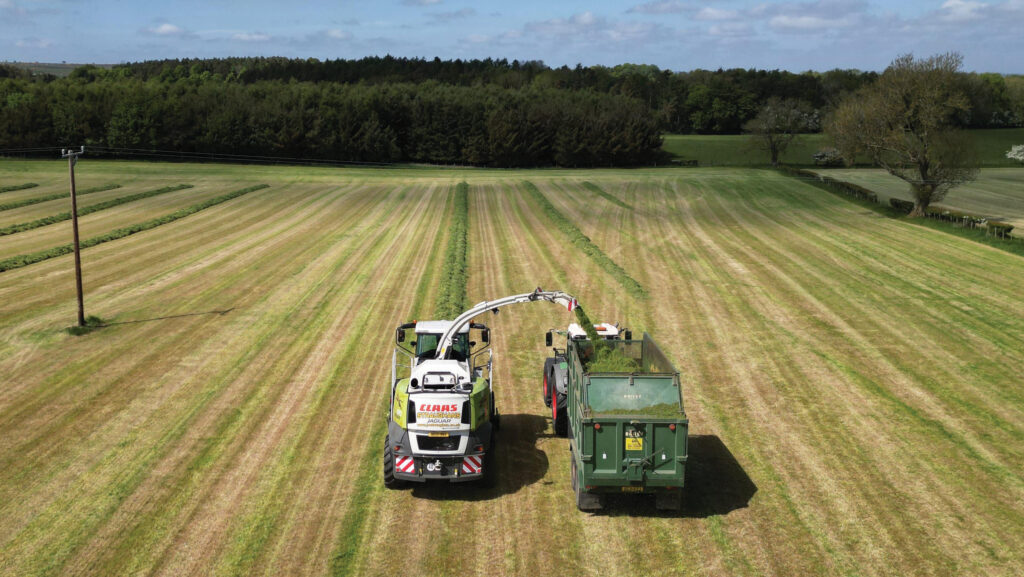
Silage campaign kicked off earlier than usual; crops delivered on quality and quantity © JO Straughan
As for spec, the Dickinsons plan to go for parabolic springs this time – the current ones are on rocking beams selected for hillside work – and all will have hydraulic top sheets.
“Ejector trailers would be nice,” says Stuart. “But we priced up a fully specced KTwo with weigh cells, sheets and lights a couple of years ago and it came in at £62,000.”
Though it means a slight reduction in total fleet carrying capacity, the two wagons can step in for longer hauls.
“We tend to use tractors and trailers on runs of up to six miles.
“Any further and it’s more cost effective to use a wagon – we can legally drag 29t, they’ll manage the same 7mpg as the tractors, and the tyres are far cheaper.”
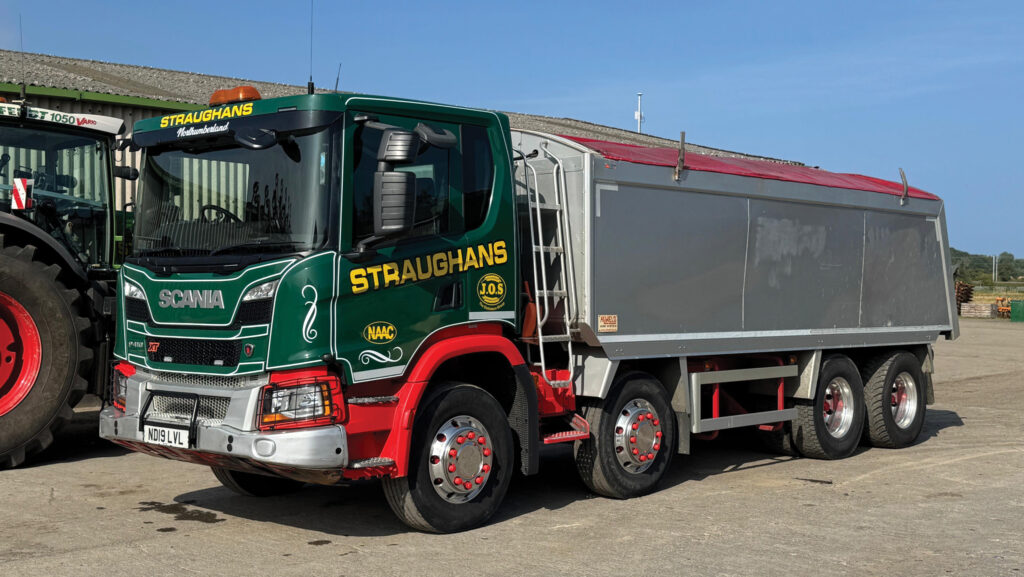
New arrivals include this Scania tipper © JO Straughan
Since our last visit, the business has taken delivery of a 19-plate Scania P410 XT eight-wheeled tipper.
It was landed at a four-day Euro Auction sale in Goole and joins the Dickinsons’ existing Volvo FM and a Scania R540, which spends 95% of its time hauling grain with an artic trailer.
And it has no shortage of work.
“We could do with three of four of them for utilities contracts [mainly biosolids] and stone haulage.
“There’s certainly scope to grow this side of the business given how many houses and business parks are being built,” says Roger.
As with the ag side, finding bums for seats is one of the biggest challenges. But it does offer opportunities for the firm’s existing workforce.
“The wagons keep us busy year-round and we’re always keen to put the men through HGV training, provided we get a commitment from them that they’ll stay for three years to cover the expense.
“We don’t mind investing in the right men with the right attitude. But we don’t want to be incurring costs that other businesses benefit from.”
New drill arrives… then departs
Changes on the drilling front saw an 8m Vaderstad Rapid swapped for a 6m Horsch Pronto, and a 4m Lemken power harrow disc toolbar with 2,300-litre split tank front hopper replace a brace of 12-year-old Solitairs.
The two-for-one trade meant the cost to switch was minimal, and it adds more flexibility for sowing companion crops in the autumn – oilseed rape with buckwheat and fenugreek; winter wheat with linseed and clover.
However, it’s arrival proved a merry-go-round. It turned up in early spring, long before its June delivery date, but was then shipped up to a Borders farmer who was desperately awaiting an identical model.
A new order went in, and the machine was subsequently delivered… in the wrong spec. It will be rehomed, with delivery of the as-ordered version slated for late August.
“Rickerby and Lemken have been very good in sorting it out,” says Roger.
“And the move from two drills to one shouldn’t be a problem, as we’re seeing more demand for non-inversion establishment.
“Plus, we’ve still got plenty of firepower.
“There’s the new Pronto, a 4m Vaderstad Rapid and a two-year-old Weaving tine drill on a Kuhn power harrow, which only cost £16,000 and paid for itself in its first two months of work,” he adds.
“That’s how we like it – get the implements paid off early and making a profit as soon as possible.”
Tractors changes pending?
There might be some big decisions to make on the tractors too, all driven by Agco’s Route 66 policy and the resulting reallocation of its brands to specific dealers.
That has left the Fendt outlet a long way from the depot at Stannington and, conversely, Massey Ferguson on the doorstep.
Three Massey 8Ss (two 245s and one 265) have already infiltrated the Fendt-dominated fleet, hired in for five months to pull Bunning spreaders on biosolids.
And they could end up being a more permanent fixture as the older Fendts start to hit Straughan’s 8,000-hour red line.
However, the decision won’t come down to the performance of the machine alone, with dealer backup and fleet management technology now carrying almost equal weight.
“The 8Ss have performed well, the cabs are nice, and the 500-litre fuel tanks mean they can put in a full shift without stopping,” says Stuart.
“And the quality and reliability of the machine is obviously important, as it’s mega money to sort any problems these days,” he says.
“But if we had to change brands it would probably be to Massey as we get on very well with Carrs Billington, which is critical when we’re so reliant on their laptops.”
There’s also the nagging feeling that the Fendt products have been slightly cheapened.
“Manufacturers – not just Fendt – get the machine right, then seem to start shaving off some of the production costs. It’s not a new thing – we had the same with our old Lexion 460s,” he adds.
“The 724s are a good example – the Gen6s never quite matched the 15-plate models, which felt like they had a lot more power.
“And they’ve suffered from quite a few problems – water pumps, radiators, air-con, leaky spool blocks, and cheap Chinese solenoids that corrode through water ingress, apparently from too much washing.”
Then there’s the issue with technology, particularly when it comes to transferring variable rate application maps and job sheets.
“Having all the machines capable of speaking to one another would save so much time, but the big brands seem to be blocking any joined up thinking,” says Stuart.
As it is, the two combines and forager are on Claas Connect and the tractors run Fendt Offboard software.
“Fendt Offboard hasn’t delivered quite as we expected, Massey’s technology is 10 years off, and John Deere’s is seriously expensive, so it’s hard to know which way to go.”
Change of brand?
The jury is out when it comes to replacing the 11,000 hour 939.
Roger’s son, David, fancies a Claas Axion to link into the firm’s Connect technology platform, Roger favours a Fendt 942 – irrespective of the Route 66 debacle – and Stuart isn’t ruling out a Massey 9S.
“We need a couple of 400hp machines for primary cultivations, and the priority is reliable horsepower with RTK guidance,” says Roger.
“We could shave money off our running costs by changing brand, but it’s a decision we can only afford to take once. It comes down to cost per hour, so we need to use our business brains.”
As for the rest of the fleet, Fendt appears to have the edge.
“The 728 has been perfect for baler and combi drill work – relatively lightweight and with that bit more power than the 724s to keep the dog wagging the tail,” he says.
“We’ll also have our eyes on the new Fendt 800 series when it comes out later this year.”
Kit list
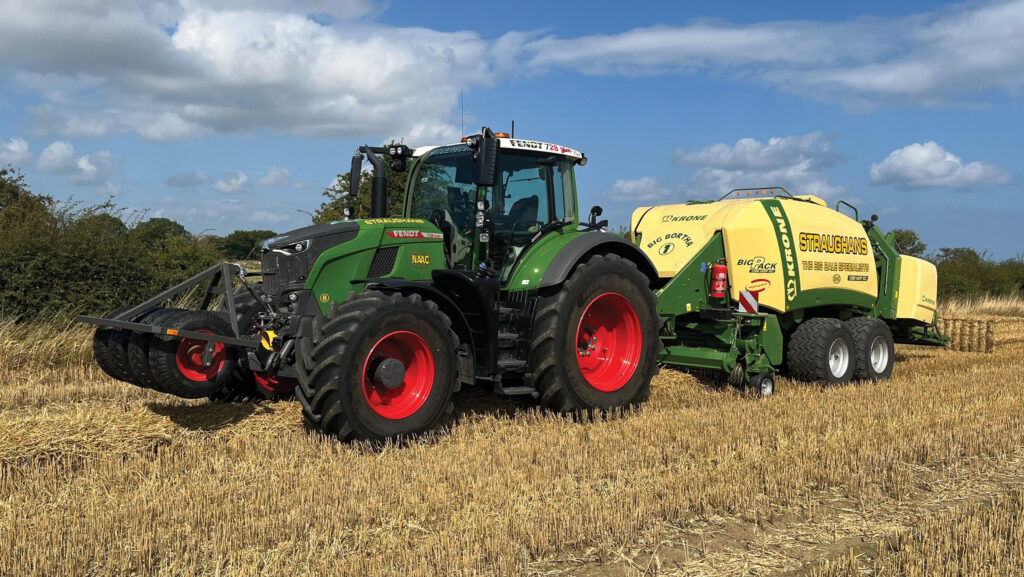
The Krone 1290 has been laid up following a major split in the main frame © JO Straughan
- Tractors Fendt 1050, 939, 728, 724 x4, 720; Massey Ferguson 8S.265 and 8S.245 x2 (hired for summer)
- Combines Claas Lexion 8700TT (10.8m header) and 760TT (9.3m header)
- Forager Claas Jaguar 970 with Direct Disc cutterbar and 12-row maize header
- Balers Krone 1290 x2, 890 and Comprima
- Handlers JCB 419S and TM320S; Claas Scorpion
- Cultivators Simba Great Plains SL 5m and 4m, Simba Unipress 8.3m, Vaderstad Rexius Twin 820, He-Va Cambridge rolls 12.2m, Vaderstad Cambridge rolls 8.2m, Simba 23D discs x2, Lemken and Kverneland ploughs, He-Va subsoilers and Sward Lifter
- Drills Horsch Pronto 6m, Vaderstad Rapid 4m, Kuhn combi 6m and 3m, Lemken combi 4m, Vaderstad Tempo eight-row, Samco six-row
- Muckspreaders Bunning Lowlander 120 HBD x3
- Wagons Scania R540, Volvo FM13 500, Scania P410 XT eight-wheeled tipper, Fruehauf bulk trailers, Kassbohrer low-loader
- Plant Volvo EC160 excavator, Cat 953C traxcavator, and JCB 8027 Zx

